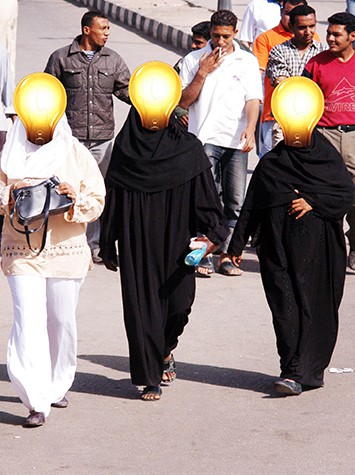Nowadays and following decades of research it is no secret that women are critical to the economic development of every country, especially in developing societies. As it has been proven, women are core for a country’s good governance, and for it to enjoy a healthy and active civil society. In order to create a grassroots movement towards democracy, women must be included in all arenas of life.
As a starting point, investing in education for women produces higher results than educating men. In general, educated women have more chances of working and generate more income. In Egypt, among those aged 15 – 64 years, the male labor force participation rate is 2.8 times the female participation rate. However, the female labor force participation rate rises with education. It is estimated that the gender gap in the labor participation rate decreases among university graduates to less than 1.5, comparing to 4.3, among those with no education.
Educated women more than non-educated women feel invested with power to make free, well informed decisions about their families and reproduction. Family planning carried out by governments has proven to be a positive measure in different developing societies. However, educating women and giving them control over their decisions and choices, helping them to become confident, is a much more powerful and long-term measure that has an impact over generations. Closing the gender gap requires a stable and serious compromise from all sides: government, policy makers, men and women themselves.
One of the most outstanding examples of an educated woman who has actively worked to improve the situation of women in Egypt is that of Nawal El-Saadawi. A psychiatrist, physician and a writer, El Saadawi founded the Arab Women’s Solidarity Association and wrote several books about women in Egypt and women in Islam. She inspired and continues to inspire many women who, following her example, became active in the fight for egalitarianism. Always striving for equality, Nawal El Saadawi was very conscious that closing the gender gap would not only benefit women, but Egypt at large. And she was right.
In the past fifty years, the developing regions who have invested more in girl’s education – Latin America, eastern and southeastern Asia- have significantly progressed in terms of economy and society. On the contrary, developing regions that lag behind regarding investment in girl’s education have seen their growth tremendously affected –Sub-Saharian Africa, the Middle East, and Southern Asia. These regions are affected by the highest percentages of illiteracy across the globe, with southern Asia leading the ranking with a 55 percent of non-educated women.
Communities where women have more control over resources are also a proof that equality also profits the society at large, as women are more likely to invest in their families than men do. Studies carried out in countries in the five continents provide us with very telling data: women tend to dedicate a bigger percentage of the household budget to health, nutrition and education, and less to cigarettes and alcohol.
When talking about politics, and needlessly to say, giving women voice and a space to participate not only expands civil rights but also benefits the road to democracy. Having a wider range of political choices and diverse points of view has a profound effect on the level of tolerance, understanding and consensus of a population. In the Egyptian case, women have been politically active since the 1990s. Through NGOs, among their communities or as part of pressure groups, Egyptian women have made important gains over the parts decades: they have helped raising awareness on women’s rights, amended some laws part of the Personal Status Law, pushed for political participation of women, fought against issues such as violence against women or Female Genital Mutilation.
Following the revolution in 2011 and encouraged by the wave of enthusiasm and cultural activism, many new initiatives were launched aiming at gender equality in Egypt. The number of civil organizations and NGOs increased visibly in the aftermath of the uprising and since then it has not stopped growing. The Uprising of Arab Women in the Arab World, Fouada Watch, Dignity Without Borders,Tahrir Bodyguards or ShoftTaharrosh are some of the groups campaigning and working for women’s rights and equality.
However, advocacy for women’s rights has not come without obstacles, especially in more conservative societies. For instance, in Egypt quite often the concept of women empowerment has been resisted and rejected as it has been strongly associated with secularism and “Western-oriented values”. Leaders in societies like Egypt have the responsibility of taking into account the voices of women. There is, as well, good news. Although women have been second-class citizens for decades, now that these leaders start to acknowledge the importance of women for economic and social development, they steadily –very slowly- have started to practice the exercise of pushing women forward – of course, always taking good care not to clash with the conservative institutions in these entrenched patriarchal societies.
Leaders, policy makers, men and women need to be aware of the fact that gender disparities affect girls and women the most, but at the end all of society pays a price for inequality. Women are active members and strong promoters for positive change who can benefit the community at large. Efforts and real compromises must be made to empower women through education, participation in the socio-political sphere and control over resources.
Twitter: @TahrirBG_DWB
Facebook: https://www.facebook.com/DignityWithoutBorders
YouTube: https://www.youtube.com/channel/UCJw9LI8aERP8C9MTOwwPUqA

